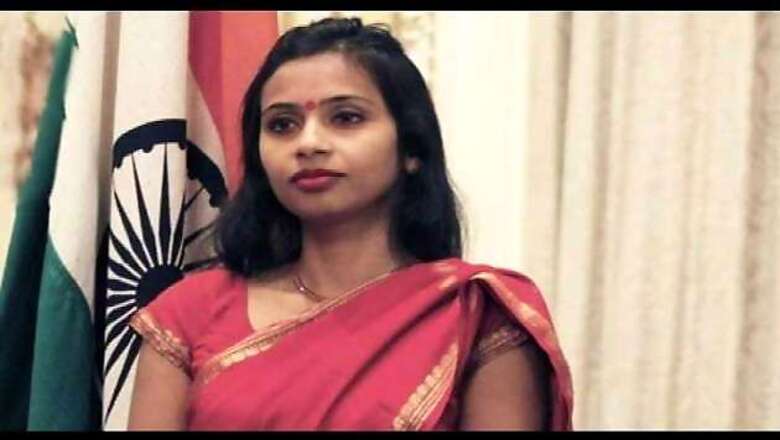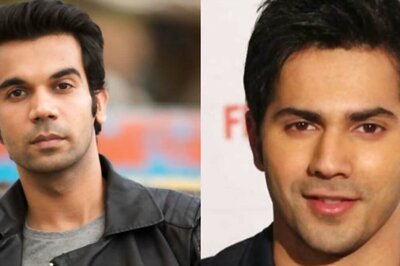
views
The arrest of Indian diplomat Devyani Khobragade, 39, deputy consul general in New York, on charges of visa fraud and lying about payments to her housekeeper, Sangeeta Richard, has sparked outrage in India and protests this week in both countries. The following is a timeline of events emerging in New York:
Fall of 2012 - At Khobragade's home in India, the diplomat meets at least twice with Richard to discuss potential employment as her housekeeper in New York. September 27, 2012: Khobragade electronically files with the US State Department for an A-1 visa, available only to persons traveling on official business for their nation's government.
October 15, 2012 - Khobragade electronically files for Richards with the US State Department for an A-3 visa, which is typically given to personal employees and servants of A-1 visa holders and requires an interview.
November 1, 2012 - Richard appears at the US Embassy in New Delhi to be interviewed in connection with the visa application, but is told she needs to return at a later date "with the necessary paperwork," according to papers filed in US District Court in Manhattan.
November 11, 2012 - Khobragade and Richard go to Khobragade's residence in India "to obtain an employment contract to bring to her interview at the US Embassy," court papers said. The contract, dated November 11, 2012, states that Richard "will be paid wages at the prevailing or minimum wage as required by law, whichever is greater. The expected hourly salary in the US would be $9.75," the court documents said.
November 14, 2012 - Khobragade and Richard appear at the US Embassy in New Delhi and provide the contract which "represented that understood she would make $9.75 per hour working as a domestic helper in the US" and would work 40 hours a week in New York, court documents said. November 15, 2012 - Khobragade receives an A-3 visa for Richard.
November 2012 - "Shortly before departing to the airport in India," Khobragade calls Richard to her residence to sign "an enlarged and electronically edited version of the first contract," court papers said.
The second contract is altered to say that Richard would be paid 25,000 rupees a month, with an additional 5,000 rupees a month for overtime, for a maximum monthly salary of that "will not exceed 30,000 rupees," according to court documents. That's about $480 a month, or about $3.31 an hour for a 40-hour week, or less than half the $7.25 legal minimum, according to prosecutors. The so-called second contract makes no mention of maximum or minimum hours per week that Richard will be required to work.
November 23, 2012 - Khobragade signs a contract with Richard in New Delhi in which Richard agrees to come to the US as Khobragade's domestic servant.
June 22, 2013 - Richard, who is scheduled to return to India, leaves the Khobragade apartment on Manhattan's East 43rd Street, and has not returned since. Devyani Khobragade goes to the New York Police Department's 17th Precinct on East 51st Street, seeking to file a Missing Persons report on Richard, who she claims has disappeared from the home.Police decline to take the report because Khobragade is not a direct relative and Richard is an adult.
June 24, 2013 - Khobragade contacts US State Department officials to report Richard missing.
June 25, 2013 - Khobragade sends a letter to 17th Precinct NYPD Deputy Inspector James Sheerin, informing him that her housekeeper has gone missing and again requesting assistance from the NYPD to locate her. Two days later, detectives met Khobragade outside her residence, and the report was filed. Late June 2013 - Aakash Singh, Khobragade's philosophy professor husband, takes the couple's two children on a vacation to the US Southeast. He returns to New York with the children sometime before July 8, 2013.
July 8, 2013 - Singh arrives at the 17th Precinct, but the New York police and Khobragade's attorney offer different accounts of what happened next.
Police said Singh reported that Richard had stolen property from his home and he asked to file a grand larceny complaint against her, but he could not identify the missing items. An officer sent him home to get a list of the missing items and their monetary value, explaining that grand larceny complaints require itemized documentation of at least $1000 worth of property. Police said Singh never returned and didn't respond to a follow-up call.
Khobragade's attorney Daniel Arshack has challenged this account, saying that Singh did in fact provide police with a list of the items on July 8. Arshack said Singh is not overly familiar with US laws, denies using the term grand larceny and thought he was simply reporting a theft to police.
Arshack said when a detective asked him whether he wanted to press charges, Singh became reluctant and decided he would first speak with consular officials and return to the precinct later to complete the complaint process. He concurred with police that Singh left without completing a theft report, and failed to respond to a follow-up attempt by New York police.
That same day, Khobragade, accompanied by consular officers, speaks with Richard in Midtown Manhattan at a meeting Richard initiated through Access Immigration, a New York immigration assistance organization. Arshack says this is the last face-to-face meeting between the two women before Khobragade's arrest.
During the encounter, Khobragade urges Richard to honor her visa requirement and return to India, while Richard demands cash and new immigration documents, Arshack said. The meeting grows so contentious that Access Immigration officials who are present call New York police to escort Richard out of the room. Access Immigration has declined comment other than to say the group is no longer working on Richard's case.
July 2013 - Dana Sussman, staff attorney with Safe Horizon, a group that fights human trafficking, is contacted by an unidentified community organization seeking "immediate services" for Richard, the lawyer told Reuters. She meets with Richard, contacts US State Department officials and soon is speaking to the US Department of Justice (DOJ).
The Khobragade criminal investigation begins. September 9, 2013 - India's Hon'ble High court of Delhi orders an injunction against Richard, restraining her from initiating legal proceedings against Khobragade.
December 11, 2013 - Preet Bahara, US Attorney for the Southern District of New York, files a criminal complaint against Khobragade with a federal magistrate court judge on one count of visa fraud and one count of making a false statement. If convicted on both counts, Khobragade faces a maximum of 15 years in prison.
December 12, 2013 - Sometime between 9 am and 9:30 am local time, Khobragade is approached by US State Department Diplomatic Security Service agents near her children's school on Manhattan's East Side. "Ms. Khobragade was accorded courtesies well beyond what other defendants, most of whom are American citizens, are accorded," Bharara said in a statement released late on December 18.
"She was not, as has been incorrectly reported, arrested in front of her children. The agents arrested her in the most discreet way possible, and unlike most defendants, she was not then handcuffed or restrained. In fact, the arresting officers did not even seize her phone as they normally would have.
Instead, they offered her the opportunity to make numerous calls to arrange personal matters and contact whomever she needed, including allowing her to arrange for child care. This lasted approximately two hours. Because it was cold outside, the agents let her make those calls from their car and even brought her coffee and offered to get her food."
After being transported to the US District Court building in downtown Manhattan, Khobragade is turned over to US Marshals Service personnel, and strip-searched and placed in a holding cell in the courthouse.
Bharara, in the December 18 statement, said that Khobragade "was fully searched by a female Deputy Marshal - in a private setting - when she was brought into the US Marshals' custody, but this is standard practice for every defendant, rich or poor, American or not, in order to make sure that no prisoner keeps anything on his person that could harm anyone, including himself. This is in the interests of everyone's safety."
Khobragade is arraigned before US Magistrate Judge Debra Freeman, and released around 4:30 pm after posting bail, surrendering her passport and other measures.
December 20, 2013: Richard is believed to still be in New York City.
Sources: Indian court order, criminal complaint by US Attorney's office, Bahara's statements from December 12 and 18, Reuters interviews with Khobragade attorney Arshack, Safe Horizon attorney Sussman, interviews with NYPD officials.


















Comments
0 comment